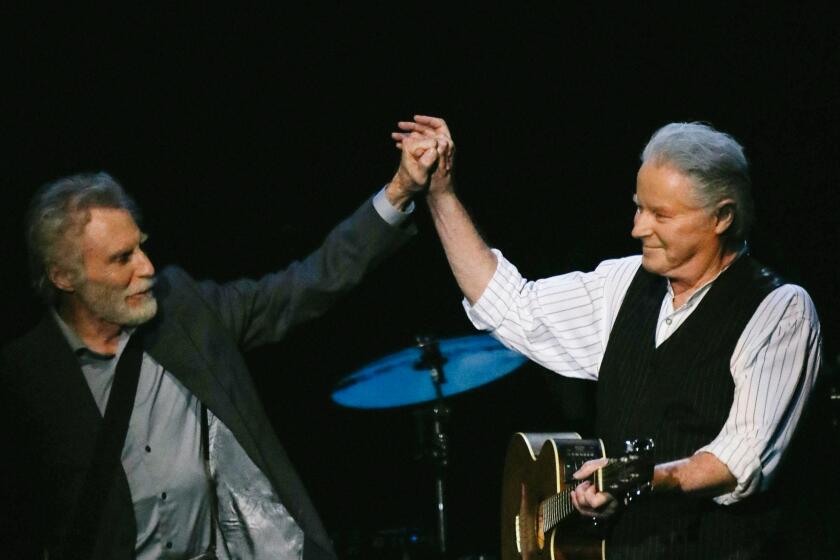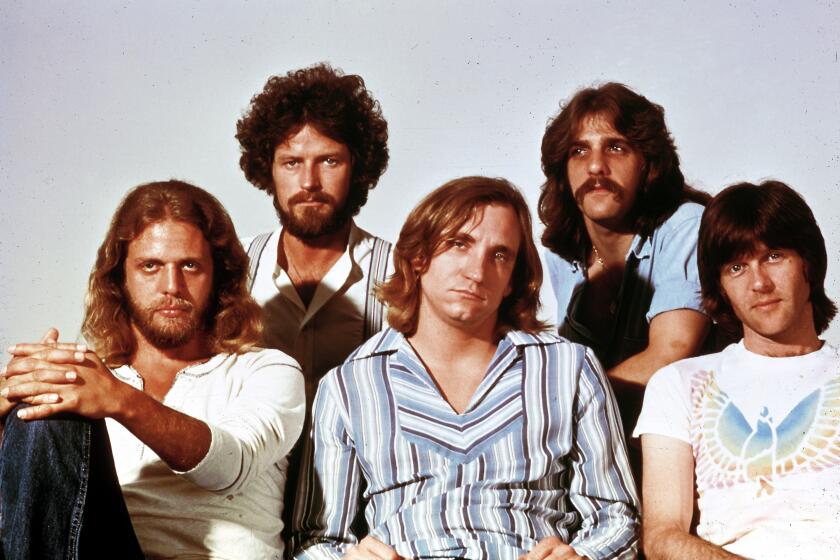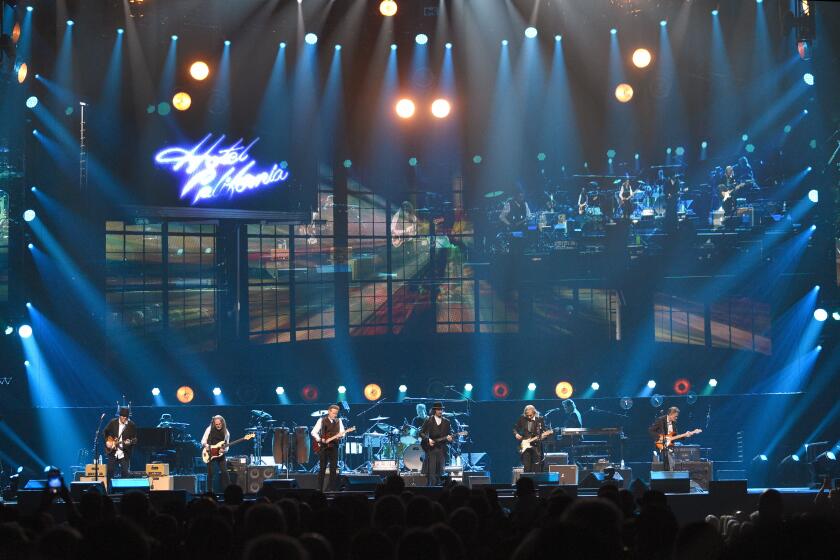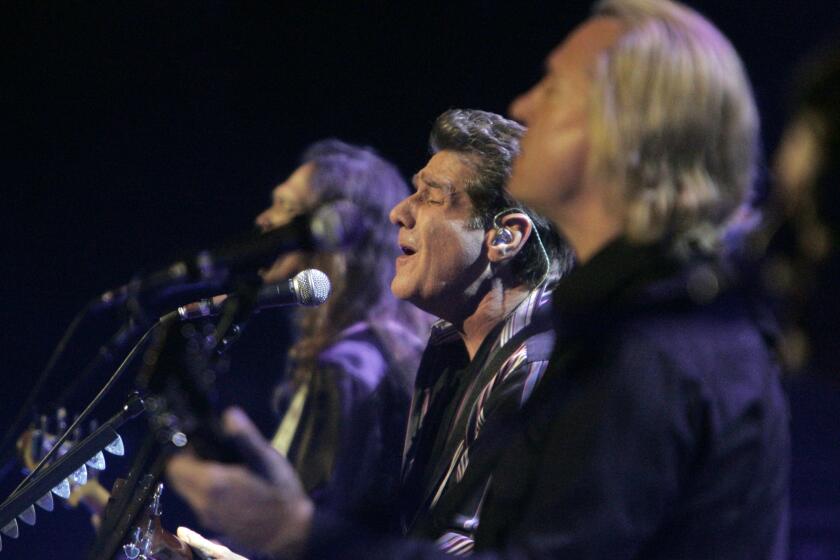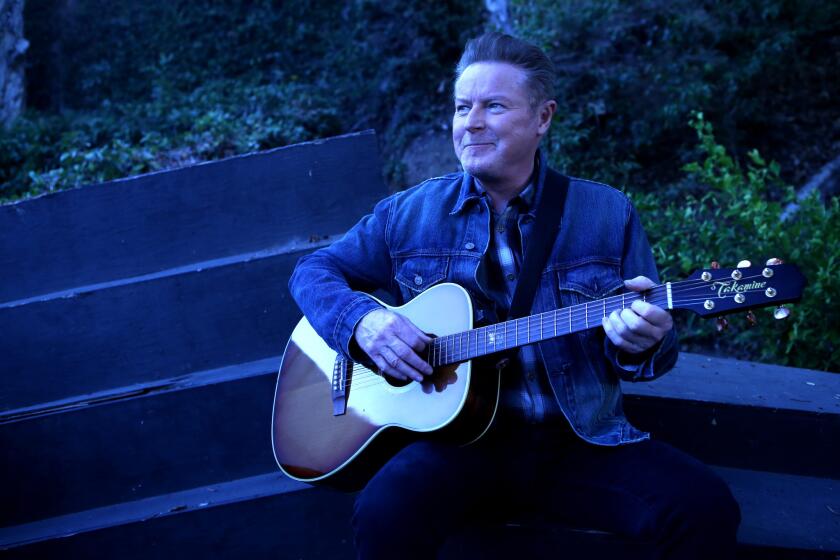Eagles’ Don Henley revisits a 1980 arrest as he testifies in case about draft ‘Hotel California’ lyrics
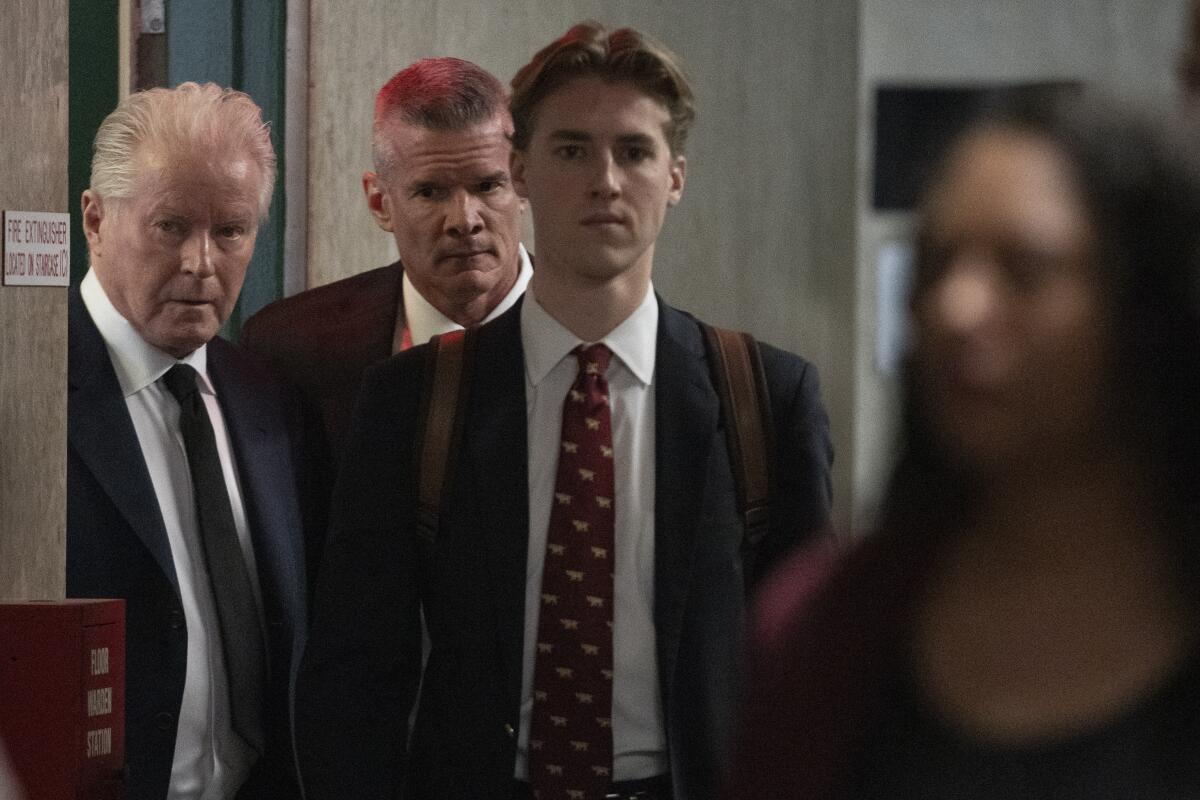
- Share via
NEW YORK — Don Henley testified Monday that a “poor decision” led to his arrest in 1980, when authorities said they found drugs and a 16-year-old sex worker suffering from an overdose at his Los Angeles home.
Henley was asked about the arrest as he testified at a criminal trial surrounding what he says were stolen, handwritten draft lyrics to “Hotel California” and other Eagles hits.
Henley was in the New York courtroom Monday to talk about something else — his version of how handwritten pages from the development of the band’s blockbuster 1976 album made their way from his Southern California barn to New York auctions decades later. But a prosecutor asked about the arrest early on, apparently to do so before defense lawyers could.
Henley said he called for a sex worker on a night in November 1980 because he “wanted to escape the depression I was in” over the breakup of the superstar band.
“I wanted to forget about everything that was happening with the band, and I made a poor decision which I regret to this day. I’ve had to live with it for 44 years. I’m still living with it today, in this courtroom. Poor decision,” the 76-year-old testified in a raspy drawl.
The Eagles, with some help from special guest J.D. Souther, began their Long Goodbye to L.A. audiences with a sold-out show at the band’s ‘home field.’
As he has maintained in the past, Henley said he didn’t know the girl’s age until after his arrest and that he did cocaine with and went to bed with the girl, but never had sex with her. “I don’t remember the anatomical details, but I know there was no sex,” he said.
The Grammy-winning singer and drummer and vociferous artists’-rights activist is prosecutors’ star witness at the trial, where three collectibles professionals face charges including criminally possessing stolen property. They’re accused of colluding to veil the documents’ questioned ownership in order to try to sell them and deflect Henley’s demands for their return.
The defendants — rare-book dealer Glenn Horowitz and rock memorabilia specialists Craig Inciardi and Edward Kosinski — have pleaded not guilty. Their lawyers say there was nothing illegal in what happened to the lyric sheets.
At issue are about 100 sheets of legal-pad paper inscribed with lyrics-in-the-making for multiple songs on the “Hotel California” album, including “Life in the Fast Lane,” “New Kid in Town” and the title track that turned into one of the most durable hits in rock. Famed for its lengthy guitar solo and puzzlingly poetic lyrics, the song still gets streamed hundreds of millions of times a year.
In July, three men were indicted in an attempt to sell the manuscripts, stolen property belonging to the Eagles’ leader. But the story begins in the ’70s with a shelved biography.
The defendants acquired the pages through writer Ed Sanders, who began working with the Eagles in 1979 on a band biography that never made it into print. He sold the documents to Horowitz, who sold them to Kosinski and Inciardi. Kosinski has a rock ‘n’ roll collectibles auction site; Inciardi was then a curator at the Rock & Roll Hall of Fame.
In a 2005 email to Horowitz, Sanders said Henley’s assistant had sent him the documents for the biography project, according to the indictment.
Henley, however, testified Monday that he only gave the biographer access to the documents, not possession of them, and that he never wanted them to become public.
They contain, he said, “some of the stupid stuff we wrote down before we got to the final lyrics of the songs.”
For the first time ever, the Eagles played the “Hotel California” album in its entirety, after which they performed two-plus hours worth of hits.
“It just wasn’t something that was for public viewing. It was our process. It was something very personal, very private,” he said. “I still wouldn’t show that to anybody.”
He reported them stolen after Inciardi and Kosinski began in 2012 to offer them at various auctions.
Henley also bought four pages back for $8,500 in 2012. He testified that he resented having to buy back what he contends was his own property. But he said he saw it as “the most practical and expedient” way to get the auction listing, which contained photos of the lyrics sheets, off the internet.
Kosinski’s lawyers, however, have argued that the transaction implicitly recognized his ownership.
Glenn Frey grew up in Detroit, the town best known musically for the catchy R&B music that came out of Motown Records, and the home of hard-charging rock acts such as Bob Seger, Mitch Ryder & the Detroit Wheels and the MC5.
Meanwhile, Horowitz and Inciardi started ginning up alternate stories of how Sanders got hold of the manuscripts, Manhattan prosecutors say.
Among the alternate stories were that they were left behind backstage at an Eagles concert, that Sanders received them from someone he couldn’t recall, and that he got them from Eagles co-founder Glenn Frey, according to emails recounted in the indictment. Frey had died by the time Horowitz broached that last option in 2017.
Sanders contributed to or signed onto some explanations, according to the emails. He hasn’t been charged with any crime and hasn’t responded to messages seeking comment about the case.
Kosinski forwarded one of the various explanations to Henley’s lawyer, then told an auction house that the rocker had “no claim” to the documents, the indictment says.
Don Henley marvels at the broad range of music he was immersed in growing up in northeast Texas, near where the Lone Star State borders Arkansas and Louisiana.
Meanwhile, regarding the 1980 case brought up at trial, Henley said Monday that he called firefighters, who checked the girl’s health, found her to be OK and left, with him promising to take care of her. The paramedics, who found her in the nude, called police, authorities said at the time.
Henley said Monday that she had recovered and was preparing to leave with a friend she’d had him call, when police arrived hours later. Authorities said at the time of the incident that they found cocaine, quaaludes and marijuana at his Los Angeles home.
Henley pleaded no contest in 1981 to a misdemeanor charge of contributing to the delinquency of a minor. He was sentenced to probation and a $2,500 fine, and he requested a drug education program to get some possession charges dismissed.
More to Read
The biggest entertainment stories
Get our big stories about Hollywood, film, television, music, arts, culture and more right in your inbox as soon as they publish.
You may occasionally receive promotional content from the Los Angeles Times.
